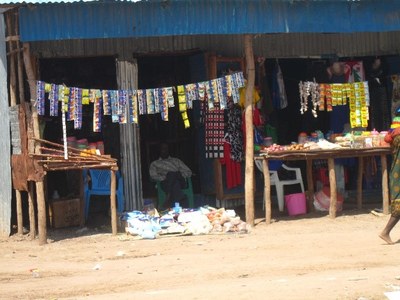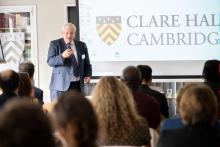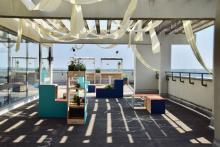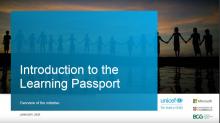
The Cambridge Emergency and Displacement Group (CEDG)
The interdisciplinary Cambridge Emergency and Displacement Group (CEDG) brings together existing research groups, projects and individuals working on displacement, emergency relief, on refugee camps and holding centres globally, particularly but not only in the Global South. It aims to draw upon extensive research experience of academics and graduates working with displaced, migrant and refugee communities and individuals and with international humanitarian organisations, public and private sector aid givers and national and local government agencies so as to address the pressing challenges associated with global human movement.
The group focuses on the need to understand how emergency situations and forms of relief as well as the creation of new sites and spaces affect the aspirations and opportunities of individuals and groups’ livelihoods and their ability to control their own lives. In that context, the group aims to generate new strategic initiatives which will support displaced communities involving the use of new construction material, new architectural approaches, new digital, audio/visual technologies and or new educational and health programmes. The aim is to support these communities ‘in waiting’ with the power to build viable livelihoods, shelters, functional and sustainable learning environments at the same time as facilitating new modes of civic engagement, belonging and new prospects for leading productive lives.
The focus of research collaborations is to construct, in a holistic integrated way, the needs and values of migrant communities themselves, to contribute to humanitarian efforts internationally and to find innovative solutions to the consequences of every changing global human movements and the new social orders they create.
The first phase of this group involves finding ways to collaborate across disciplines and to identify common themes, regional interests and existing external partnerships. Through a series of meetings, members of the group have identified a variety of important conceptual agendas around the notion of ‘space’, instability, the importance of thinking about ‘tomorrow’, the power of visual and digital literacies, above all the need to establish partnerships with displaced and refugee communities.
Initial presentations by group members have identified common research interests and the possibility of shared research bids around the architectural conditions for mental health, applying existing educational strategies around critical, creative thinking to migrant contexts, and the uses of digital/visual literacy to explore the notion of ‘waiting’.
Convenor: Emeritus Professor Madeleine Arnot (Education)
Participants: This is an interdisciplinary group with over 40 participants from different engineering departments, various architectural units, language education, design and technology education, disability and gender education studies, digital technology and educational technology, middle eastern studies, sociology/politics, history, psychology, social anthropology, One Health and public health. Please find the contact details of our members here.
Events:
 |
No Place Like Home? Policy Workshop on refugees and forced displacement. Full report found here |
 |
Collaborative architectural summer school for for students at the University of Cambridge and the Technical University in Berlin News story here Event here
|
The CEDG consists of the following four Sub-Groups:
1. Sustainable Shelter Group (SSG)
Coordinators: Dr Mark Breeze (Architecture), Jennifer Ward George (Architectural Engineering)
The Sustainable Shelter Group (SSG) is a research and design collaborative that brings together professional design expertise, academic research, and experienced humanitarian practitioners to create integrated, sustainable and relevant sheltering solutions at any scale and in any geography.
https://www.humanmovement.cam.ac.uk/Research/ssg
2. The Educational Challenges of Displacement
Coordinators: Martin Johnson and Sally Brown (Cambridge Assessment)
The CUP/UNICEF project on Learning Passports completed its first phase. The report was launched at the World Education Forum (WEF) ( 19th January 2020) and received positive reception. (see research proposals section below). The team are currently in discussion with UNICEF about advancing this project.
The CUP/UNICEF are currently moving forward on a planning a roundtable on ‘Education, Migration and Climate Change: how do we act now to deliver the best common future’ at the Commonwealth Heads of Government Meeting (CHOGM) 2020.
The group led by Cambridge Assessment aims to run a policy forum on Education policy for displaced people: what is the current state of play? in 2020/2021 for government ministries, stakeholders, NGOs - bringing together the experience of the UNICEF Learning Passport project, and for example educational projects by Liz Maber research on teachers' role in displacement sites, Yongcan Liu’s research on language migration.
According to figures compiled by The Refugee Council, around 50% of the global refugee population are children, and this means that education and displacement are inextricably linked at a policy level. Moreover, although developing countries look after most of the world’s refugees, we also have more than ¼ of a million displaced people in the UK. These conditions have implications for international and national policy.The group are proposing to facilitate a seminar that brings together those with an interest in policy on the theme of education, learning and displacement. In this forum we will consider the various policy solutions that impact on a number of questions (including but not exclusively):
- What policy work is being enacted to support education for displaced people in the UK and in other jurisdictions?
- What is the evidence of the impact of education for displaced people, and how is this evaluated?
- How do we ensure the quality of education for displaced learners?
- How can issues of social cohesion be dealt with through education policy?
It is hoped that the seminar will bring together policy experts from a variety of agencies. We would invite speakers from the International Development Committee; DFID; DFES; NGOs (UNHCR, UNICEF).
Outputs:
 |
Learning Passport Collaboration between Cambridge and UNICEF News story here
|
3. Knowledge and Research on Displacement
Coordinator: Dr John Orr (Architectural Engineering):
This interdisciplinary group participated in the development of the cross disciplinary graduate level methodology workshop (January 2020) and possibly a graduate teaching module, which is aimed at sharing knowledge and practice across departments around designing and conducting research emergency and displacement locations, suitable for PhD students but open to all.
It also aims to run a hackathon to design research. The focus might draw on the group’s extensive Middle Eastern experiences of fieldwork. There are also ambitions to think about a shared teaching MPhil module on emergency/ displacement.
4. Visual Narratives of Gender and Migration
Coordinators: Dr Annamaria Motrescu (Anthropology) and Dr Naures Atto (Middle Eastern Studies).
The group will promote the study of migrants' lives across various visual narratives produced and disseminated in and out of displacement. There will be a strong collaboration with leading Cambridge and international academics exploring this topic from theoretical perspectives offers by social anthropology, sociology, history, gender and media studies, and digital and social scientific research. The group will organise 3 key seminars (one/term) and a yearly two-day symposium titled ‘Visual Narratives of Migration’ (end of the Easter term; first event in 2021).
In addition, the group will aim to fundraise for hosting a six-week exhibition on the same theme – Visual Narratives of Migration – at Clare Hall, and an interactive session with students and members of the public in which they could analyse and produce digital stories about gender and migration (place tbc). They will also organise a digital art exhibition displaying refugee art in Cambridge in 2020, aiming at a broad audience.
